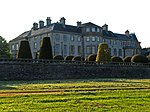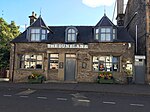Bridge of Allan railway station
Beeching closures in ScotlandFormer Caledonian Railway stationsPages with no open date in Infobox stationRailway stations in Great Britain closed in 1965Railway stations in Great Britain opened in 1848 ... and 5 more
Railway stations in Great Britain opened in 1985Railway stations in Stirling (council area)Railway stations served by ScotRailScotland railway station stubsUse British English from June 2022

Bridge of Allan railway station is a railway station located in the town of Bridge of Allan, north of Stirling, Scotland. It lies between Stirling and Dunblane on the Highland Main Line, Glasgow to Aberdeen Line and Edinburgh to Dunblane Line.
Excerpt from the Wikipedia article Bridge of Allan railway station (License: CC BY-SA 3.0, Authors, Images).Bridge of Allan railway station
Henderson Street,
Geographical coordinates (GPS) Address External links Nearby Places Show on map
Geographical coordinates (GPS)
| Latitude | Longitude |
|---|---|
| N 56.1566 ° | E -3.9573 ° |
Address
Bridge of Allan
Henderson Street
FK9 4NA , Inverallan
Scotland, United Kingdom
Open on Google Maps









